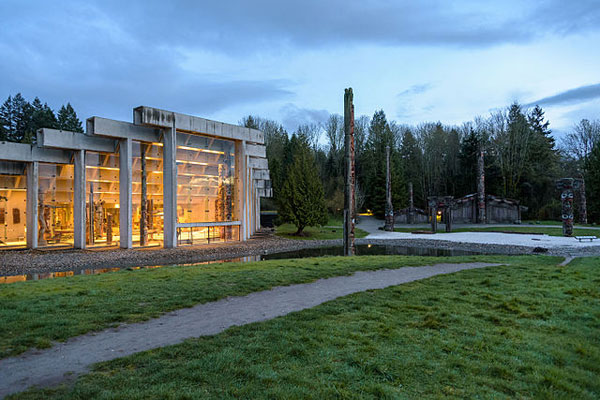
April 19, 2019; Hyperallergic
All monetary figures below are in Canadian dollars.
On Tuesday, April 16, 2019, the Canadian Museum Association (CMA) announced that its Canadian Museum Reconciliation project will receive $1 million for two initiatives designed for advancing reconciliation in collaboration with the country’s Indigenous communities.
“In our interconnected world, museums have become ever more essential to the preservation of cultural diversity and appreciation,” Vonda Vitale, executive director of the CMA, emphasizes in a statement, describing the new program as “ambitious, comprehensive, and inclusive.”
A CMA Reconciliation working group has already been formed.
The first award of $680,948 will look at national policies and best practices among the network’s 2,600 museums and cultural institutions to make sure they are compliant with United Nations Declaration on the Rights of Indigenous Peoples, and to make recommendations.
The second initiative is uniquely significant in that $351,508, a sizable portion of the million, will be used for the professional development of its workers, the people who are charged with implementing key museum functions with respect to those policies and procedures. Those workers will receive professional education related to projects like a national museum-worker bursary program, museology reports, workshops, online learning modules, and more.
The CMA project is the offspring of the work of The Truth and Reconciliation Commission of Canada (TRC), founded by the members of the Indian Residential Schools Settlement Agreement to bring reconciliation and mend the ruptured relationship between Canadians and the Indigenous peoples. The commission studied and documented the lasting impacts of the Canadian Indian residential school system on Indigenous students. Its 2015 report concludes that establishing and operating Indian residential schools was equivalent to cultural genocide of aboriginal peoples. Canadian Encyclopedia lists some of these human rights violations.
Students were isolated, their culture disparaged—removed from their homes and parents, separated from some of their siblings (the schools were segregated according to gender) and in some cases forbidden to speak their first language, even in letters home to their parents.
Sign up for our free newsletters
Subscribe to NPQ's newsletters to have our top stories delivered directly to your inbox.
By signing up, you agree to our privacy policy and terms of use, and to receive messages from NPQ and our partners.
The executive summary of the TRC report says that museums and archives “have interpreted the past in ways that have excluded or marginalized Aboriginal peoples’ cultural perspectives and historical experience….as history that had formerly been silenced was revealed, it became evident that Canada’s museums had told only part of the story.”
“The Canadian Museums Association has an important role to play in the reconciliation process with Indigenous Peoples in Canada,” Minister of Canadian Heritage and Multiculturalism Pablo Rodriguez said. “Cultural spaces, like our museums and other heritage institutions play a fundamental role in bringing our communities together by enriching our understanding of our shared history.”
Meanwhile, in December 2018, the provincial government of Ontario diverged from Canada’s reconciliation movement when it announced that it had decided to cut millions from major art collections in order to balance its $1.7 million deficit. The Indigenous Culture Fund created to facilitate easier access to grant funding for First Nations, Inuit, and Métis community-based cultural projects is included in the cuts, with its budget cut in half.
In an interview with Canadian Art, Jesse Wente, director of the Indigenous Screen Office, said, “There is an incredible need for trained Indigenous arts administrators right across the sector in Canada,” he said, “So the loss of any positions of this type, and of the talent in those positions, is deeply concerning.”
“The Indigenous Culture Fund could have been essential for allowing Indigenous communities to take an active role in repairing the losses incurred due to the legacy of residential schools,” Anishinabek Nation Lake Huron Region Chair Scott McLeod said to Sault Online. He added that the fund, which just started in 2017, “has been cut off at the knees before it was given a chance to flourish.”
The fact that Ontario’s cuts undermine the positive reform happening in Canada is discouraging. It is encouraging, though, that Canada, through its Reconciliation projects, is systematically addressing barriers to access for all Canadians and Indigenous peoples to a far-too-long ignored culture.
Smithsonian reports that when speaking to the CBC’s Jessica Wong, Sarah Pash, a CMA board member, executive director of the Aanischaaukamikw Cree Cultural Institute, and chair of the Cree School Board, expresses this vision:
I would like to be able to walk into museums and to see the Indigenous language of the territory prominently displayed in all labels and signage. I would like to be able to have experiences in an Indigenous language within a museum. I would like to see Indigenous people working in the museum [and] on the boards of major museums. That’s where the real change happens.
For further insight into Canada’s Budget 2019, read Keenan Wellar’s article and Steve Dubb’s piece on Winnipeg Art Gallery’s international Indigenous art festival.—Meredith Betz













